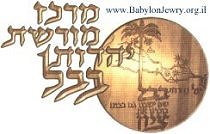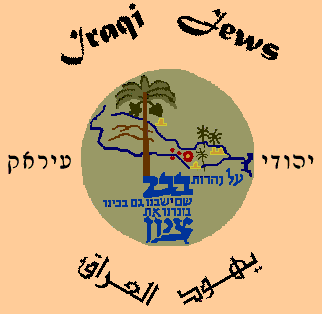Ballads of Baghdad to be played at the Barbican
Point of No Return
June 1, 2012
A film-maker, an actor and a musician are working together to honour the Jewish contribution to Iraqi music in a forthcoming documentary film, On the banks of the Tigris*, produced by Marsha Emerman, writes Andrew Harris in the Australian Jewish News. The last scene will be a concert hosted by London’s Barbican on 27 September 2012 and starring the Israeli-Iraqi musician Yair Dalal. Here is an excerpt from Harris’s AJN article (3 October 2008):
IN the mid-1970s, Saddam Hussein set out to purge the Iraqi musical canon of undesirable contributions. He was faced with a quandary – the work of legendary Jewish brothers Saleh and Daud Al-Kuwaiti was so ingrained in Iraqi cultural identity it couldn’t be removed. Instead, he officially labelled them “folk songs”, and that’s how two generations of Iraqi listeners came to know them.
Iraqi-Shi’ite actor Majid Shokor,now 39, escaped Iraq via Lebanon for Australia, after refusing a position at the Iraqi National Theatre. He lives in Melbourne with his wife and children. While living in Beirut, he read an article about a weekly meeting of Iraqi-Jewish musicians in a Ramat Gan community hall, soon after which he discovered many of his favourite songs were the work of Jews.
“This music was and is still part of our lives,” he says. “Everyone knows these beautiful songs. They express Iraqi life: Iraqi celebrations, Iraqi sadness, Iraqi love.”Shokor met Melbourne film-maker Marsha Emerman three years ago,and they set to work on a documentary, On the Banks of the Tigris, that would recognise the Jewish contribution to Iraqi music. There were also plans for a live concert with Iraqi musicians of all denominations.
In December 2006, the two found themselves in Ramat Gan, in the thick of Tel Aviv’s Little Baghdad. Shokor was greeted with open arms.“It was an amazing journey for me,” he says, “and a beautiful sight really”.
Twenty years before Saddam’s cultural purge, the Al-Kuwaiti brothers were superstars. They had composed for the legendary Egyptian singerUmmKoulthoum, performed at King Faisal’s coronation ceremony and were his favoured entertainers, never once hiding their Jewishness. When they left it all behind to migrate to Israel in the1950s, they were sprayed with DDT and shunted into tents like all the new arrivals. But despite their isolation from the Arab world, they continued to perform regularly on The Voice of Israel radio, to a huge number of listeners,the majority well beyond Israeli borders. And these days, you’re as likely to hear their songs sung in Ramat Gan’s Little Baghdad, as in a taxi in the Arabian Gulf.
Yair Dalal, the most prominent proponent of Iraqi-Jewish music today, took Shokor and Emerman to the weekly Ramat Gan gathering Shokor had read about in Beirut. They met and interviewed the surviving handful of Iraqi-Jewish musicians who had played in the mostly Jewish Iraq Radio Orchestra of the 1940s: blind qanoun (Iraqi zither) player Abraham Salman, nay (bamboo flute) player Alber Elias, oud player Elias Shasha and singer Jacoub El Allailly, all of whom are in their 80s.
“Now they are very old. This is the last moment,” says Dalal, adding that all the musicians’ children have not followed in their footsteps.“This is the tragedy,” he says. “They thought that music is not a respectable enough profession.”
He thinks that apart from the hard work involved in pursuing a musical career, the assimilationist attitudes thrust upon new Iraqi immigrants to Israel has filtered down to a generational split in cultural identity.
One of the Radio Iraq Orchestra musicians’ contemporaries, the late Filfel Gourgy, was particularly remarkable. Growing up in Iraq, Gourgy learned Iraqi maqam (the regional musical register) from Muslim singers, and left for Israel in his 20s. Then, on Tel Aviv’s Arabic radio station, he would recite koranic verses at the beginning and end of daily 12-hour broadcasts, which were transmitted through the Arab world. Outside of Israel, no-one knew he was Jewish.
“Most people in Arab countries, didn’t think that a Jewish person could read Arabic and the Koran,”Shokor says. “And he had such a beautiful voice.”
While filming in Israel for On the Banks of the Tigris, Shokor came to understand the ongoing issues of Israelis identifying with Arab cultures in Arab countries.
“The culture, the music, the accent, everything was another class, not an Israeli class. That’s why they didn’t really have enough opportunity to express their culture, their music, their ideas.”
And yet, with his faith placed firmly in one man, he’s optimistic about a shift in sociocultural opinion. “It’s time to build a new generation of music,” Shokor says. “Yair is working very hard.”
IF Gourgy represented the sort of cultural bridge-building once possible, modern-day oud virtuoso, peace-maker and Iraqi-Jewish cultural ambassador Dalal is an example of what could be possible in the future. Born in Israel in 1955 to Iraqi emigre parents, Dalal says he felt pressure to lose his Iraqi identity.
Still, his parents spoke Arabic with him at home. And although he initially learned western classical violin, there was no escaping his heritage and identity. “I have Arab culture in me,” he says.
Over the years, Dalal’s affinity with Middle Eastern and Arabic music has led him to many fruitful cross-cultural collaborations. He has performed and recorded with the Arava’s Azazme Bedouin, whose music he discovered while working as a desert guide: “It’s very simple,” he says, “and very beautiful”.
He also fondly remembers playing with the great Nubian musician and ethnomusicologist Hamza El Din, who died in mid-2006. “We played a few concerts together,” Dalal says. “He was very, very unique.”
Over the years, Dalal became a star of the international world music scene, while enduring
an uphill battle to gain popularity at home – though, he says, times are changing. Across Israel, in his studio Almaya, at Tzfat’s Rimon school, and elsewhere, Dalal students are picking up where the old guard is leaving off. “It’s happening already,” he says of the re-engagement with the Iraqi-Jewish musical tradition. A number of students are pure Ashkenazi – today’s multicultural Israel appreciates good music.“Not my generation, the next generation, they are more open-minded,” Dalal says.
“They have been all over the world, so they are into it.”The influences of Arabic music and Indian music are filtering through Israeli society and have in turn brought attention to the Iraqi-
Jewish music tradition, says Dalal. Still, popular acceptance is a long way off. “People don’t appreciate it, the establishment doesn’t appreciate it. It’s Arabic music, not Israeli music.”
When I ask Dalal where he would play his dream concert, his answer comes as no surprise:
“In Baghdad.” He says he’d like to play with Iraqi musicians, of all religious denominations.
“Some of them I am in touch with,” he says. Iraq is, after all, only a phonecall away from Israel.



